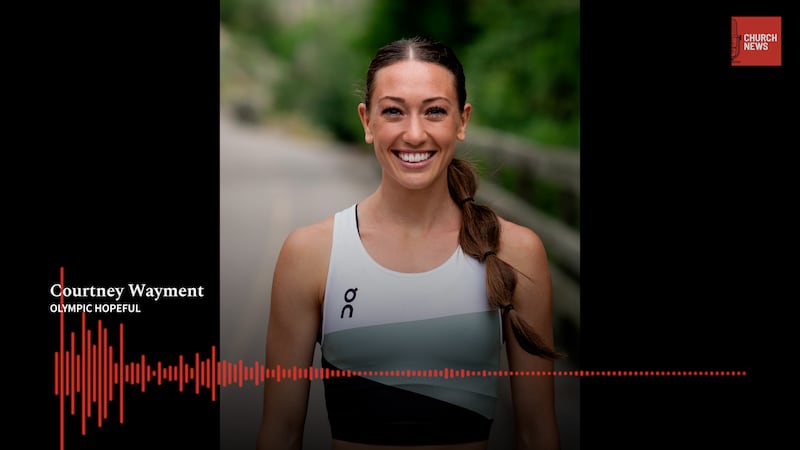Courtney Wayment is a world-class track athlete who competes in the 3,000-meter steeplechase and is currently preparing for the United States Olympic trials. Her success spans from her collegiate career at Brigham Young University to two Team USA senior national teams and running at the World Athletics Championships.
Wayment joins the Church News podcast to talk about her remarkable career, preparing for the Olympic Games, and what running and The Church of Jesus Christ of Latter-day Saints have taught her about “belief, resilience, faith and hope.”
Listen to the Church News podcast on Apple Podcasts, Amazon, Spotify, YouTube or wherever you get podcasts.
Transcript:
Courtney Wayment: Running has taught me a lot about belief, resilience, faith and hope. And the things that I have learned from running are similar things that I have learned from the Church. And there’s so many places that you can find it. You can hear it from a podcast like this, and other people sharing their stories. You can hear it in quiet moments in church. You can hear it in the warmth of your home. And I would say some of my best and most spiritual experiences have come from running. It’s taught me so many things, and it’s rooted me so wholeheartedly down into that. I think they go very hand in hand. And I think for myself and in my life, it’s been very evident and obvious that God’s hand is so deep into our lives, and everything is very intertwined.
1:00
Sarah Jane Weaver: This is Sarah Jane Weaver, executive editor of the Church News, welcoming you to the Church News podcast. We are taking you on a journey of connection as we discuss news and events of The Church of Jesus Christ of Latter-day Saints.
Courtney Wayment is a world-class athlete that competes in the 3,000-meter steeplechase and is currently preparing for the United States Olympic trials. As a Brigham Young University student, Courtney was a four-time NCAA Division I champion and an eight-time All-American.
The Latter-day Saint athlete put an exclamation point on her stellar college career by winning the women’s steeplechase at the 2022 NCAA Track and Field Championships in Eugene, Oregon. At the meet, she clocked a personal best time of 9:16, breaking her own school record, the collegiate record and the meet record, while running the fifth-fastest steeplechase time in United States history.
Since then, she has competed with two Team USA senior national teams, running at the World Athletics Championships in Eugene, Oregon, in 2022, and in Budapest, Hungary, in 2023.
2:11
She joins the Church News podcast to talk about her remarkable career, her feelings about The Church of Jesus Christ of Latter-day Saints and, of course, her preparation for the Olympic Games. Courtney, welcome today.
Courtney Wayment: Thank you so much. I’m excited to be here and excited to dive into my running world and my faith.
2:30
Sarah Jane Weaver: Well, I hope we can start and just familiarize our listeners with what the steeplechase is, because I think this is the hardest sport in the world. You run a long way for a long time. Sometimes your feet get wet. Tell us what this entails for people who aren’t regular watchers of the steeplechase.
2:52
Courtney Wayment: Yeah, so the 3,000-meter steeplechase, it’s seven and a half laps on an outdoor 400-meter track. And you have, per lap, you have four — they’re called “barriers,” but think of them as hurdles. The difference between a barrier and a hurdle is a barrier goes across like three to four lanes. And if you hit it, you go down. It does not move. It is a large block. And hurdles, if you hit a hurdle, the hurdle will fall down. So, you have about four of those per lap. And then with 150 meters to go, you have a water jump. And it’s the same thing as the barrier. However, there’s a deep-to-shallow pool with water in it. And the caveat with that is instead of hurtling it, you’re supposed to prop one leg up on it. So, you jump up onto the barrier, push off with one leg, land with the other leg, one foot in the water and then one foot out, and keep the momentum going.
So that’s what it looks like. And I personally think it’s the best race in track and field. It’s the most fun. But yeah, it’s definitely — it’s very physically challenging, for sure. But that’s what makes it a lot of fun.
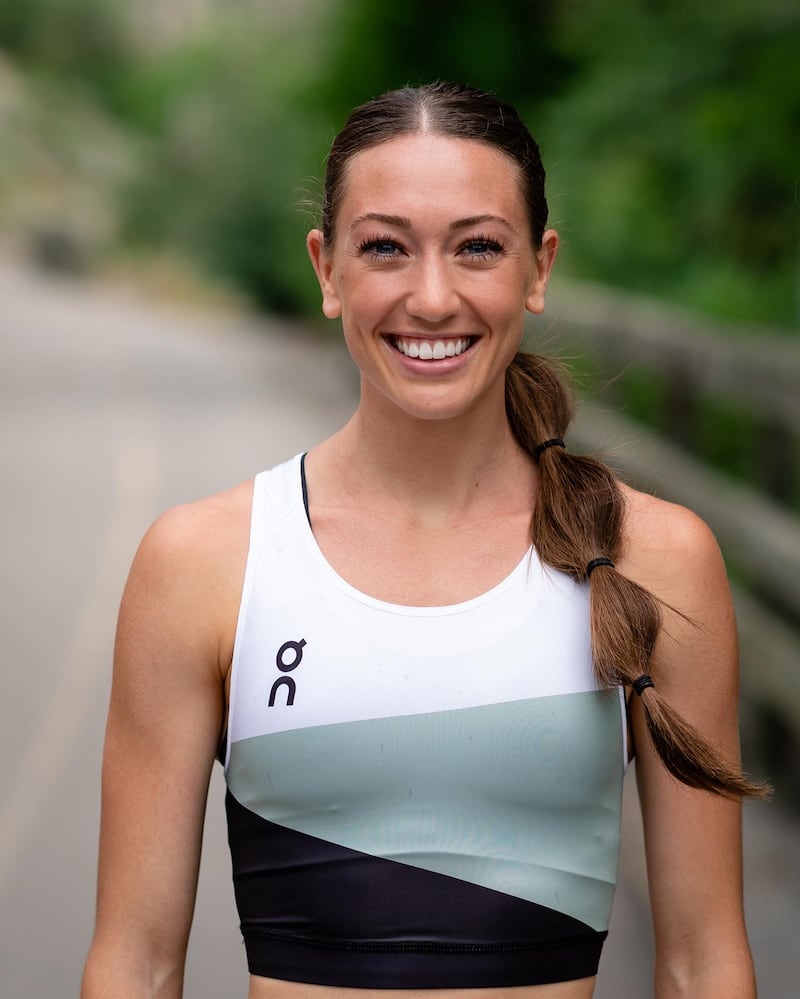
4:02
Sarah Jane Weaver: And we are now coming up on a really important Olympic Games — I love Olympic years — and you’ll be participating in the Olympic trials. What is on your mind as this big thing comes up?
4:18
Courtney Wayment: I would say the thing that’s on my mind as it comes up is faith over fear. This will be my second Olympic trials that I’ve been fortunate enough to compete in. And three years ago, in 2021, we had the Olympic trials. And how the Olympic trials work and how you make a team is you have to run in Olympic standards, you have to run a specific time, and then you have to get to the Olympic trials. And you have to make the final, and then you have to be Top 3 in the final race. So, there’s a couple different caveats with it. And three years ago, I had the timed run, I’d made the final, and I got fourth. And I was the first person off of the Olympic team three years ago.
And that was my motto, was “Faith over fear,” going into that race, where I just had faith that whether I made a team or I don’t — or I didn’t then, and I guess it still applies now — whether I make a team or I don’t, having faith in the process and having fun with the journey of it. And so, that’s kind of my mentality, like, going into Olympic trials.
5:26
Sarah Jane Weaver: I’m so glad you brought up that race. When I think of your career, I think of that moment where you’ve trained, you’ve worked, you’ve sacrificed, you’ve spent hours and hours, and then you were just almost there. What did that feel like?
5:42
Courtney Wayment: A lot of people would be like, “That sucks,” you know? You’re four seconds away from being an Olympian. And I think I was 22 at the time, maybe, so I was young. And the thing about it is I felt so much joy crossing that finish line. It’s a really magical feeling when you’re in the middle of a race, like you said, that you’ve been preparing your entire life for, and, like, I’ve been dreaming that I’d be an Olympian my entire life. And when you’re racing and you have two laps left, and you wholeheartedly believe that you can be an Olympian, and then you don’t get that dream, that was OK, because I believed. And that, to me, I was like, “One day, it’ll pay off. The belief will pay off.” And sometimes, the result isn’t always the reward. But having that belief, that was the reward for me that day. And yes, it did fuel me for the last couple years — made two world teams so far, and now we’re back at another Olympic year. But definitely, the belief was the reward for me in that time.
6:50
Sarah Jane Weaver: I want to go back to the very beginning of your career. You were raised in Layton, Utah, and you go to BYU. When did you first run a steeplechase? Because you probably didn’t do that in high school. And so how did you come to know A. “Running is my thing” and B. “I’m going to put my effort into the steeplechase”?
7:12
Courtney Wayment: Yeah, so, my first exposure with running has been my entire life. So, both of my parents actually ran in college. They ran at Weber State, and my dad ran the steeplechase. And he was a two-time All-American. And at the time of that age, women were not allowed to race the steeplechase, so my mom didn’t even have the opportunity back in the ‘80s. However, yeah, that’s been our whole life, me and my siblings. Everyone’s run, and that was just kind of what we did as a family. I played a lot of different sports growing up. I love soccer. Running seemed to be naturally very easy for me.
And in seventh grade, I ran the mile in gym. And I ran this mile, and my teacher was like, “Wow, you are so fast. You have to run track,” you know. “You ran this 5:58 mile.” And I was like, “I don’t know what that means.” But I was in seventh grade and 12, and it sounded great. And so I called my dad one day, and I was like, “Dad, I just ran a 5:58 mile in gym.” And he was like, “That’s super cool, Court. Probably wasn’t a full mile, but good job.” And I was super mad. And I’m a very competitive person, so I was super-duper mad. And the next week, I ran it again. And I was like, “Dad, I ran a 5:52 mile,” and he was like, “Court, super awesome. Love that for you. Probably not a full mile.” And I was like, “I’m kind of mad at you.” I’m like, “I am very good at this.” And so I decided to run track. So, I kind of got a little bit of reverse psychology right into running. So I chose running, which helped a lot.
8:47
And then before I got to BYU, a couple weeks before, we had a coaching change. And so the coach that recruited me was not the coach that was going to coach me during my collegiate career. And that was when coach Taylor stepped in. And she called everyone, everyone that was on the roster, she called all of us, and we had a 20-30 minute phone call. And in our phone call, I said, “Do you know anything about coaching the steeplechase?” And she goes, “Yeah, I know a thing or two about it.” She said, “Are you a steepler?” And I said, “Yeah, I am.”
And she goes, “Well, have you ever run one before?” And I was like, “Nope.” She was like, “So, how do you even know that?” And I just said, “I don’t know. That’s just what I — that’s what I’ve been told by my dad, by his coach, by anyone in the running world. And yeah, I think that’s just my calling in life.” And she was like, “OK,” and so she said, “There’s this number, 10 minutes and four seconds,” so 10:04. “Write that somewhere and put it somewhere that you can see every day.” And she said, “That’s the number that we’re going for.” And I was like, “OK, awesome. Love it.” So I did that exact thing.
And in my first year, I ran my very first steeple at USC, and it was just me and coach Taylor. Like, there were two other women in the race, but it was just her and I, and she ran everywhere on the field and pretty much talked to me the whole time of this race. And so we got to have this really special moment of my first one, and I ran a 10:13. And at the time, that was moving, and I was like, “Wow, I’m pretty good at this thing.” And then two weeks later, I ran at another race, and I ran 10:04. And I was like, “OK, we have,” you know, that was when me and coach Taylor were like, “Yeah, we — there’s something special here with that.” So, that’s how I got into running, and that was my first-ever steeple.
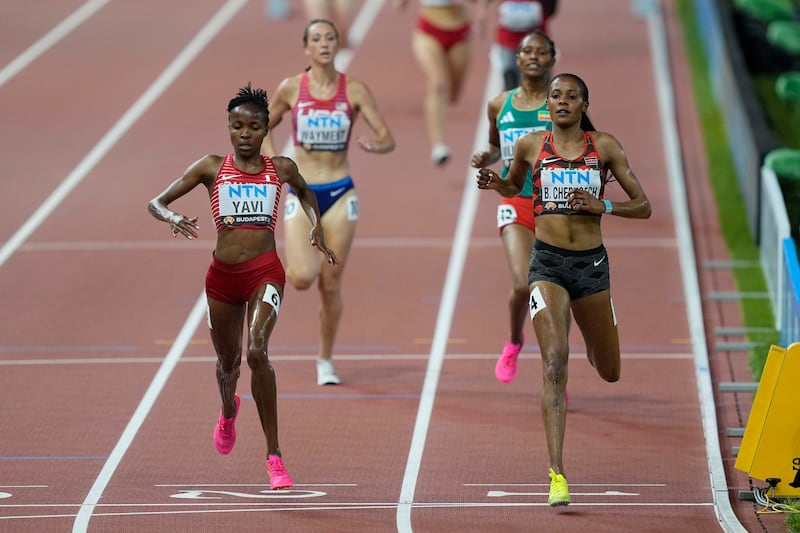
10:38
Sarah Jane Weaver: Well, now this is not a short race. Tell us what you’re thinking about while you’re running.
Courtney Wayment: Yeah, I think depending on the race, sometimes it changes. Something about me is I use a lot of key words to kind of help keep me locked in during the race. So a lot of times I’ll think about, when I’m running, “Rhythm.” I want to feel rhythmic, I want to feel smooth, I want to feel like I’m in control. And I lead a lot of the races that I run in the steeple. And so I like to feel very in control and very rhythmic. Other portions of the race — especially with a water jump — I just think “Push,” so I can push to see how far I can kind of clear the water and see how many steps I can gain on competition out of that water jump. And other parts of the race, it’s “Respect,” and you respect every single barrier, because, like I said, when your legs get tired, you can hit some barriers, and I’ve been there, and it’s not very fun.
And so, I use a lot of key phrases. And the nice thing is coach Taylor is always at my races, and so she will kind of dictate some of those words, or we’ll talk about those words before and prior to a race. So, it changes per race what I think about, but most of the time, it’s little mantras.
11:53
Sarah Jane Weaver: Tell us what happens when you fall. Because these are stable barriers. They don’t come over with you, and so I bet it hurts.
Courtney Wayment: Yeah, so I’ve taken some in my time; all steeplers have to. I mean, you get a large adrenaline shock, to be honest, because you’re falling. But yeah, it’s not really nice when you hit your knee on a large, stable block. It’s not the nicest, but I did that one time, and then I also fell in a water jump. And this was back in 2017, so it was my third-ever steeple. And once that adrenaline wears off, your body’s like, “Oh, I took a fall, for sure.” So, yeah, it’s not the nicest feeling, but, I mean, knock on wood, we haven’t had that in a hot minute.
12:41
Sarah Jane Weaver: What has running taught you?
Courtney Wayment: Running has taught me a lot about belief, resilience, faith and hope. Those would be the categories that I would say.
12:53
Sarah Jane Weaver: I’m interested in how The Church of Jesus Christ of Latter-day Saints has influenced your life, and especially how it’s influenced you as an athlete.
13:06
Courtney Wayment: I think the answer that I just gave for running, I would say the Church has done that for me, as well. Something that, especially in the last year of my life, I have really, really focused on being so rooted in faith and belief and hope and resilience. And I think the Church offers that so much to me. And there’s so many places that you can find it. You can hear it from a podcast like this, and other people sharing their stories. You can hear it in quiet moments in church. You can hear it in the warmth of your home.
And learning to build a relationship with God and Christ, it’s taught me so many things, and it’s rooted me so wholeheartedly down into that. And so I would say the things that I have learned from running are similar things that I have learned from the Church. And I think they go very hand in hand. And I think for myself and in my life, it’s been very evident and obvious that God’s hand is so deep into our lives, and everything is very intertwined. I would say some of my best and most spiritual experiences have come from running. And so, the Church has helped navigate my life to help me be really grounded in God, for sure.
14:27
Sarah Jane Weaver: Well, and so much of what we accomplish, we accomplish with the support and help of other people. You’ve mentioned coach Taylor. I’d love for you to expand on that. And then I’d love for you to talk about your parents.
14:42
Courtney Wayment: Yeah, so coach Taylor has changed my life. And I try to be as vocal about that as I can because I owe that woman a lot of credit into my life. She saw me at 18 years old with just a love for the sport, a love for running and a desperate need for growth in my life. And she was patient, she was understanding. She poured so much into me and into my cup that who I am now at 25 is not the same person that I was at 18.
And while, yes, I have put in a lot of work myself, she has single-handedly guided me and helped — just been on this journey with me. And when you have another woman that loves unconditionally and pours into you and keeps you in check when it’s needed and carries so much spiritual strength and spiritual light, she single-handedly has really, really changed the way that I view myself and my world. And she’s done that for almost a decade for me now. And I feel very, very lucky that I get to be surrounded by her, for sure.
And as far as my parents go, very similar. My parents love me like crazy, and it is so, so evident. And I have such a special relationship with my parents, especially my dad. They have made so many sacrifices for me in my life. And there are also people that any point in time, night or day, I can always call them. And I’m really thankful that I have parents that I can lean on. They have offered me a lot of strength. And they, just like coach Taylor, love unconditionally. And I’ve been so grateful for them.
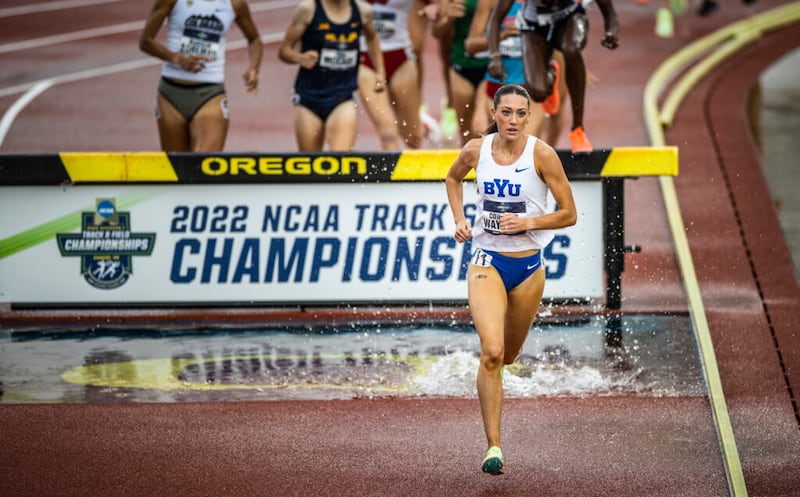
16:40
Sarah Jane Weaver: And so after you graduated from BYU, you’ve obviously spent a lot of time preparing, competing on a world stage. What else are you doing?
Courtney Wayment: I mean, my life is pretty consumed by running. Now, it’s not only my passion and my love for the sport, but now it’s my job as well. So, I’m very consumed by that. But other things that I love is I have a sweet dog named Rosie, and her and I go on a little walk every single night. And especially with the warm weather and the sunshine, she gets to play in the river by my house. And we just have very special hour to 90-minute, just, walks with her and I, and I love that.
I have awesome friends, and we do a lot of dinners and game nights and just being in each other’s presence and having fun together. I have an awesome family who — they will take me boating, or they’ll come and help me with whatever I need around the house, or I’ll go watch my nieces and nephews in whatever activities they’re doing. And it’s a simple life, but I love the life that I live, and yeah. So, those are things that I’m doing outside of it, trying to pick up little hobbies here or there, like reading or things like that, too, so.
17:57
Sarah Jane Weaver: Because you’ve had such success — both as a BYU athlete and then after that — you have had, undoubtedly, opportunities to speak to youth, to share a message with them. What is that message?
18:12
Courtney Wayment: The message that I want to be heard and shared more than any other aspect of my life, especially to the youth, is how much God knows and loves you, and how much Christ can empathize with you, and how much you can lean on Him. That is something that I so wholeheartedly believe in, and I know it for myself. And when you get the opportunity to speak to youth, you get to feel that for them.
And I feel like I’m a very empathetic person. And I know how hard it is to be a youth. I don’t know exactly what it’s like in this day and age, but the message if I can have anyone from the ages of 12 to 18 hear that God loves you, and He hears you, and He knows you. And, the good and the bad and the ugly, Christ knows. He suffered, but He also felt the joys of life, too. And so I think if you can master those two things, I think, and hear those things and learn to know those things for yourself, I think life has a good way of working out.
19:21
Sarah Jane Weaver: And I want you to take that message and now apply it to the hardest races or the other journeys of your life. How have you come to personally know that for yourself?
Courtney Wayment: In running, it hasn’t been the easiest journey. I’ve had injuries. I’ve had, you know, just navigating new things, like entering the pro world. There’s a lot of successes, especially from my last year in 2023, you know, making the world finals, nothing to bat your eyes out. But to me, I didn’t achieve all that I had hoped or wanted. So it definitely hasn’t been an easy — and I would not say a linear — path for running. But one thing I am for certain is that I know that God has given me this talent, and I know that He wants me to expand on the talent for my own good, but also to help share love and light with others.
And through running, I’ve gotten to learn, like I said, it wasn’t an easy journey. And it still isn’t, still won’t be. But in those really hard moments — when you’re in a really tough race, or you’re nervous going into a race, or you have bad workouts, or you’re in injury or sickness with running — you learn to rely on God a lot. And I talked about that Olympic trials a couple years ago. That was something that really transformed the way that I saw God knowing exactly who I am and what’s important to me.
And I used to hold the belief that “It’s just running, who cares?” You know, “Why would God care about running?” It’s such a miniscule thing. It’s a moment of time in my life, even if I have been doing this a decade, and I go another decade, it’s still a moment of time in my life. And I learned especially that day at Olympic trials, in that final, that God knows; He knows the desires of your heart, and He cares. He cares about it because I care about it. And I think when you start to learn that there’s such a personable relation between you and God, I think it really, really makes a big difference in life. I’ve known it from that aspect of running. But in my own personal life, I’ve had a lot of trials in life, as we all do.
Again, some of them have been, you know, I’ll share them on Instagram, or I’ll share them in podcasts like these, or whatever may be the case. But a lot of them are private, and they’re silent battles that you fight. But one thing, because I have spent a lot, most of my adult life, learning that God, His hand is always in your life, you see it so much clearer when you’re going through hardship. And because of that hardship, while it’s hard, and there’s a lot of silent battles, you know that there’s light. And learning that hasn’t been easy. But the more you practice and the more you apply — and I’ve been lucky, like I said, that running has helped, aided, in that practice — it’s easier to translate that into your personal life as well.
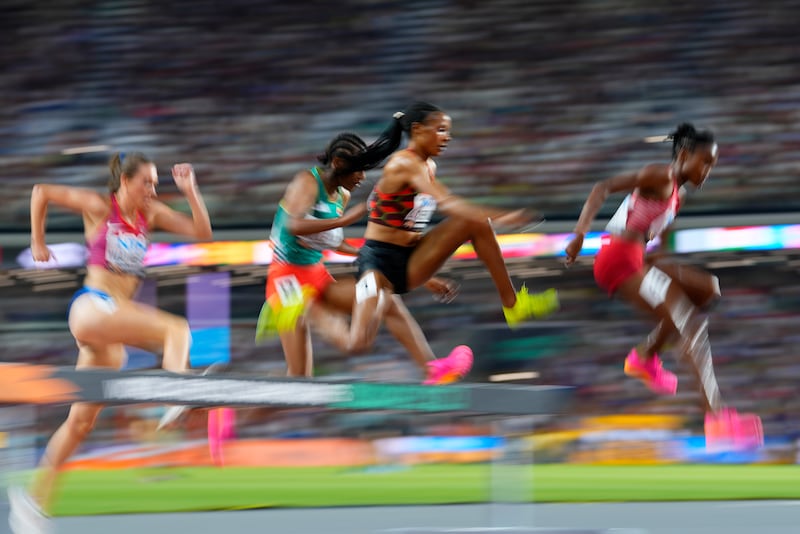
22:38
Sarah Jane Weaver: Great. I want to shift gears here from the spiritual to everything else, because you’re a pro athlete, and you had to make the decision to become a pro athlete to find a path in that journey that would work for you and allow you to maintain your values. How did you do that?
22:58
Courtney Wayment: Yeah, it’s definitely a new navigating thing, for sure. You’re surrounded by so many different types of people, which is a great opportunity. And you get to learn a lot of different things and backgrounds of people and things like that. But running professionally, it has given me a lot of good in my life. It’s challenged me in a lot of ways, it’s allowed me to grow in a lot of ways, and I’m very, very grateful for that.
There hasn’t been a whole ton of opportunities for women in pro running out of the state of Utah. There just really hasn’t been, and so I feel very honored that between myself and Anna Camp Bennett and Whittni Orton Morgan, we’ve been able to, kind of, you know, go through some ceilings, especially with the help of coach Taylor. And so it’s been nice navigating that with the same people that I was able to navigate college with. Yeah, I definitely think it helps having those kinds of people in your corner. And when you do that, I think they really help keep you on the course, or if they need to course-correct, they’ll do so as well.
24:09
Sarah Jane Weaver: I want to talk about BYU, because it is known as a national leader in track and field, especially in long distance. What was it like to be part of that program?
Courtney Wayment: It was honestly one of the best things I could have ever done for myself. I learned so many good things, I got to meet so many good people, and I got to make the most incredible memories. You know, I had mentioned earlier that running is just such a moment in time. And, to be honest, yes, I do remember most if not all of my races from college. But the things that I remember most from BYU is the memories that I made. You get to travel, and you get to go to different states, and you get to have different opportunities, and you get to be with your best friends in the whole wide world.
And something I’m so grateful for is coach Taylor helped start and cultivate a sisterhood at BYU on the women’s distance side. And with that, I had so much fun — so much fun — and those women that I made memories with from the ages of 18 to 22 or 23, those women are my best friends still. Some of them live in different states now, but we call once a week, we’re always texting, we’re always thinking of one another. And being a part of that, it was fun to help rebuild a program alongside the most incredible women. And so yes, we did have successes for sure on the track and cross country. But the memories made, that’s something that I’ll hold very dear for the rest of my life, for sure.
25:50
Sarah Jane Weaver: And we’ve all heard the stories of someone saying to a concert master or violinist, you know, “Hey, I’d give my life to be able to play like you do.” And they say, “I did give my life for this.” There is so much preparation that goes into what you do. Paint a picture of what that looks like. How do you prepare? And I mean in miles per day, in training schedule, how do you prepare for an Olympic trial?
26:19
Courtney Wayment: Yeah, that’s a good question. So, it’s a lot of running. It’s a lot of cardio stuff. Whether that’s your weekly mileage, which can range anywhere from, you know — I know some pros do like 90 miles a week, to other pros doing 40 miles a week. So, that’s a large range, but, you know, your weekly mileage. And then you have, two to three times a week, you have a really hard track workout, the kinds that put you on your hands and your knees, and you’re throwing up, those kinds of really hard workouts, we have those.
And then on top of that, there’s — some people cross-train, some people do doubles, which means you’ll have a big block; for example, in the morning, you’ll do, we’ll say, anywhere from 7 to 10 miles. And then in the evening, you do anywhere from three to five. So you’re getting a lot of miles in one day; you’re just breaking it up. There’s things like that.
So, there’s the running portion of it. But then you also have your mobility, you have your weightlifting, you have abs, then you have other, like, cross-training things like that that can be done. So there’s, again, that portion that’s on the track and running-involved. But then off of the track, it’s your sleep hygiene, it’s making sure you’re nailing 10-plus hours of sleep a night. On top of that, you need to be taking naps every week. It’s your nutrition, it’s making sure that everything that you eat has a purpose. Whether that’s for your physical health or it’s your mental health, there’s always a balance and a purpose for that. On top of that, it’s staying present and meditating or working on your emotional strength, because that’s just as much a part of it as your physical strength.
So, it comes down to every — almost every tiny decision that you make in your day is leading you towards the Olympic trials, for sure.
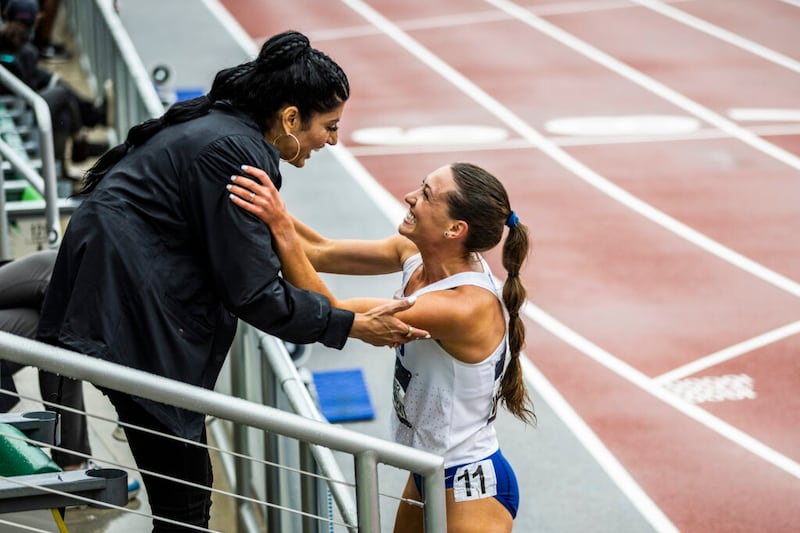
28:15
Sarah Jane Weaver: So, it’s a lot of saying, “I am going to sacrifice what I want at the moment for what I want most.”
Courtney Wayment: Yeah. Yeah, we talk a lot about sacrifices. Running is a very unique sport, where something that happens a year prior to something, that definitely makes a big difference. You could, a year out from Olympic trials, you could be like, “Oh, I don’t want to be as disciplined. I don’t want to be as this.” But it does make a difference. So, yeah, it’s a lot of sacrificing short-term things so that you can have long-term goals.
28:51
Sarah Jane Weaver: So there’s no days off for an Olympic hopeful.
Courtney Wayment: I mean, it depends on your running schedule. We get every Sunday off, so we love a good day off. But even then, you’re still consciously making decisions of “OK, maybe I need to go for a walk today so I can shake out my legs. And maybe I need to take a nap today. And what kind of food am I going to eat today? And, you know, “am I going to stay up late?” or things like that. So even then on your days off, you’re still, mentally and emotionally, still definitely putting work towards what’s going on with Olympic trials.
29:27
Sarah Jane Weaver: When you think of the Olympics, what do you think of? What comes to mind?
Courtney Wayment: I think of little me. That’s what I think of when I think of the Olympics. I think of little me that just dreamed that I’d be an Olympian one day. And I think of that dream. And there’s a very distinct moment that I remember at the age of 15; and I was walking out to the car with my mom and dad, and I looked at them, and I said, “I’m going to be an Olympian one day. I’m going to do it.” So, when I think of the Olympics, I just think of little me that just dreamed, just dreamed of having the opportunity to try to be an Olympian.
30:07
Sarah Jane Weaver: Well, and I hope you know that you have thousands and thousands of people cheering for you, who have been watching your career and so admiring the sacrifice and the work and the effort and the success you’ve had.
30:23
Courtney Wayment: I appreciate that. It’s something, like I said, I think having God on my side, that’s one thing that I — you can feel it. Like, when you are racing, I don’t know how to describe it, because it’s such a unique thing. But when you’re racing, you can feel how many people are loving and supporting and praying for your success. And again, it’s not necessarily about the result of it, but you can feel that.
And so I definitely, you know, even the little messages on Instagram, if I don’t see them, or if I don’t respond, I do see them. And you can feel it. And it’s a very unique thing. And it’s something that I’ve been very, very grateful for that I feel like God has really blessed me with. So, I appreciate all the love and support. It’s absolutely felt.
31:10
Sarah Jane Weaver: And we have a tradition at the Church News podcast. We like to end with the same question, and it’s: What do you know now? And what do you know now that you’ve learned from competition, that you’ve learned from the steeplechase, that you’ve learned from the miles and miles you’ve spent running?
31:30
Courtney Wayment: I would say what I know now is that it’s always about the journey and not always about the destination. And I’m very grateful for that, because the journey, I think sometimes we get caught up in the result or the reward, right? Like, being an Olympian. While that is a dream, you oftentimes miss out on the really small, important things. And my relationship with the Savior has definitely influenced how I am as an athlete. As an athlete, you have a lot of struggles. Some days are really good days, and some days are really bad days. And sometimes you’re physically exhausted, and sometimes you’re emotionally exhausted. And my relationship with my Savior has absolutely helped change that.
When you feel like you cannot do any more, and you feel like if it’s on the track, you can’t do one more rep, you’re so exhausted, you always can. That’s the strength from the Savior that I have come to learn very, very, very personally. And I’m very thankful for that. It has shaped me as an athlete and as a person in the good and the bad and the ugly. And that’s what I know now, for sure.
33:03
Sarah Jane Weaver: You have been listening to the Church News podcast. I’m your host, Church News executive editor Sarah Jane Weaver. I hope you have learned something today about The Church of Jesus Christ of Latter-day Saints by peering with me through the Church News window. Please remember to subscribe, rate and review this podcast so it can be accessible to more people. And if you enjoyed the messages we shared today, please make sure you share the podcast with others. Thanks to our guests; my producer, KellieAnn Halvorsen; and others who make this podcast possible. Join us every week for a new episode. Find us on your favorite podcasting channels or with other news and updates on the Church on TheChurchNews.com.


